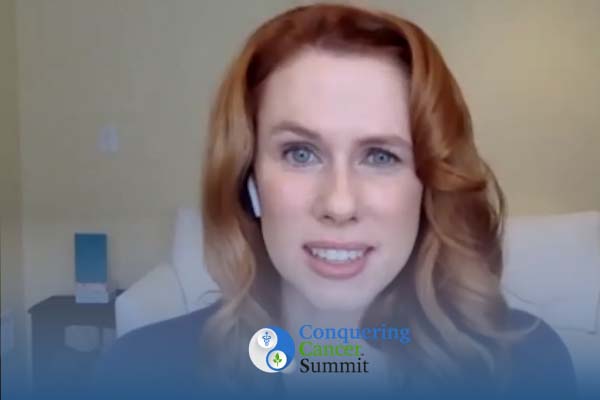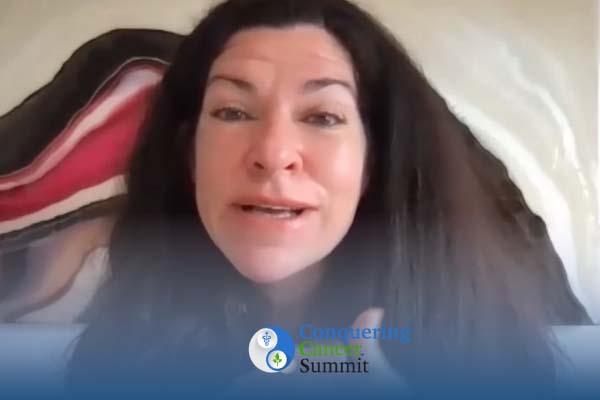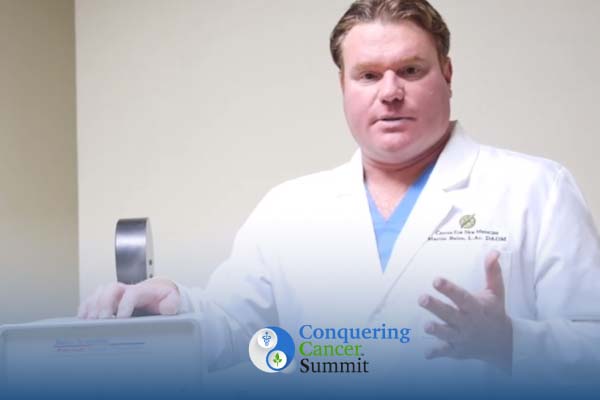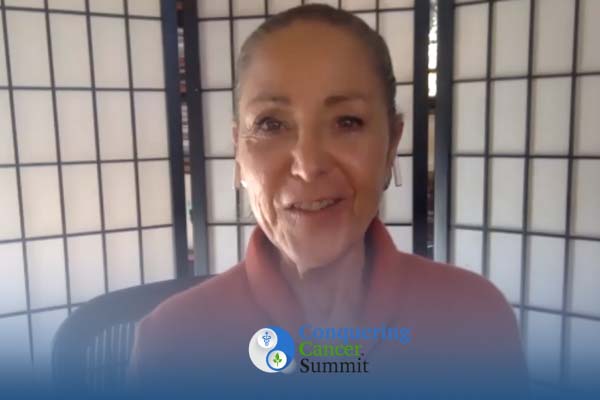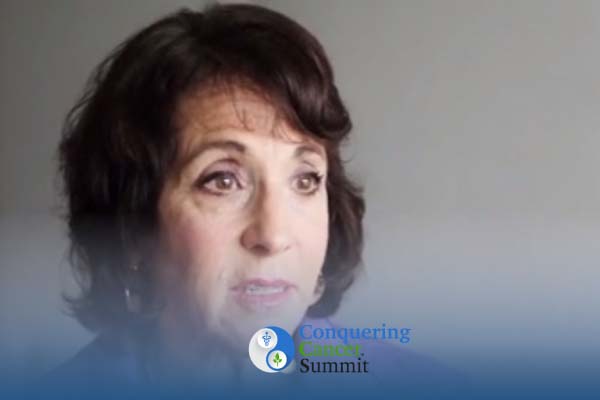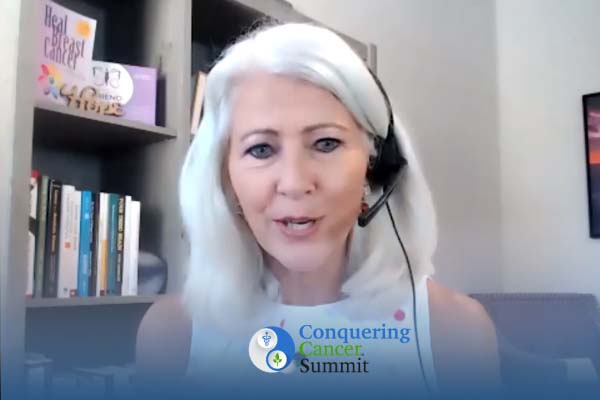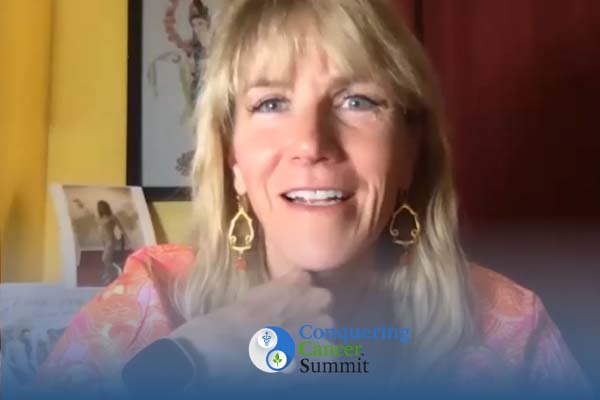Join the discussion below
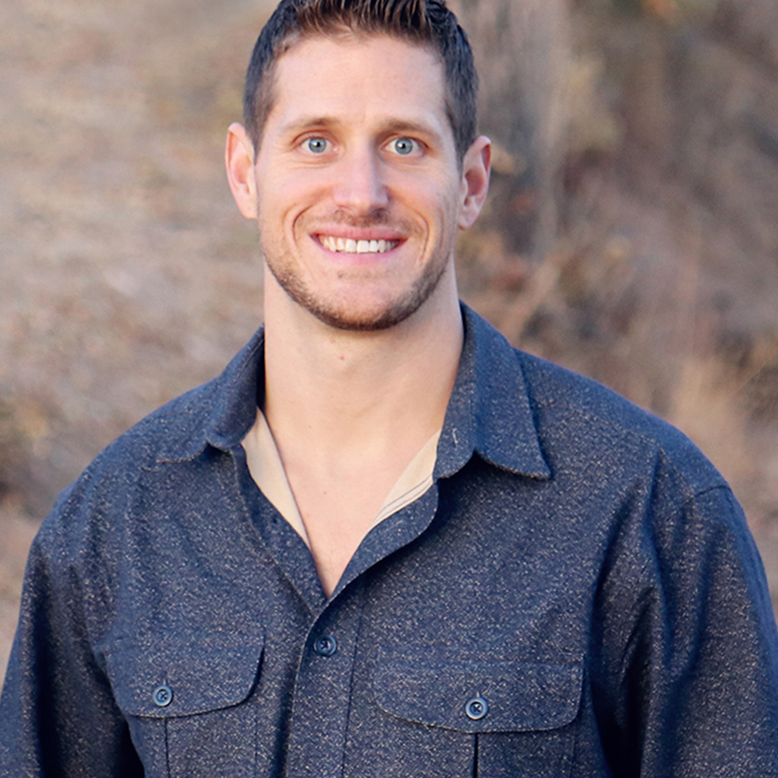
Nathan Crane is an award-winning author, inspirational speaker, plant-based athlete, event producer and 18x award-winning documentary filmmaker. Nathan is the Founder of The Panacea Community, Creator of the Global Cancer Symposium, and Director and Producer of the documentary film, Cancer; The Integrative Perspective. He is also the Director of Strategic... Read More
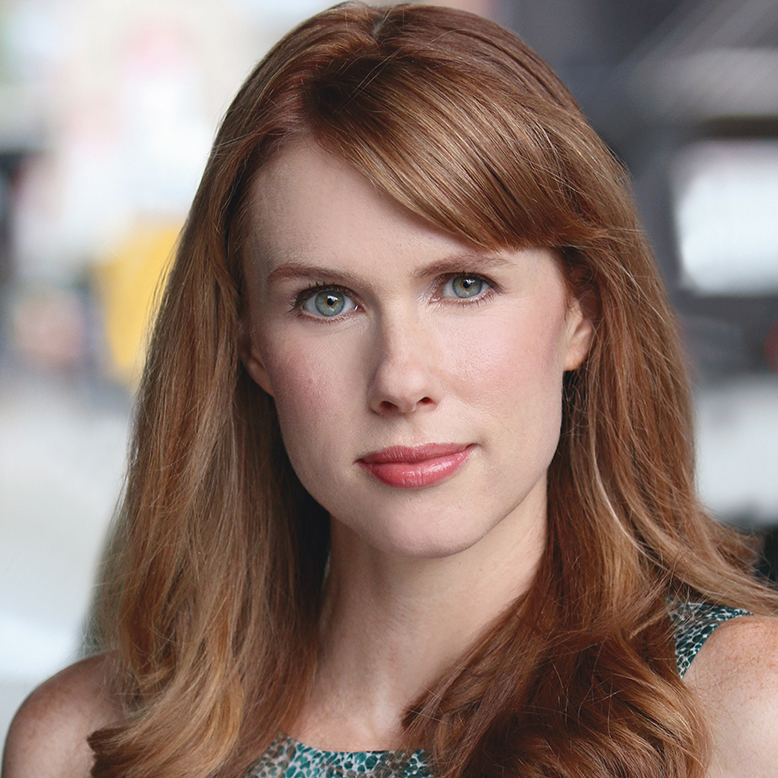
Kelly Turner, PhD is the New York Times bestselling author of Radical Hope and Radical Remission, now in 22 languages, which summarize her research into radical remissions – when someone heals from cancer or other serious diseases without conventional medicine, or after conventional medicine has failed. Over the past 15... Read More
- Incredible cases of healing that were scientifically impossible.
- How healing from stage 4 kidney cancer and stage 4 melanoma is possible beyond conventional medicine.
- The ten key healing factors for reversing chronic diseases – including cancer.
Related Topics
Alternative Medicine, Cancer, Clinical Trials, Coleys Toxins, Combining Conventional And Alternative Medicine, Conventional Medicine, Diet, Dire Prognosis, Education, Emotional And Spiritual Work, Game Plan, Gerson Therapy, Healing Factors, Hope, Immune System Functioning, Immune System Stimulation, Intuition, Lifestyle Changes, Major Diet Change, Meditation, Melanoma, Personal Choice, Postponing Conventional Medicine, Radical Remission, Statistically Unlikely RemissionNathan Crane
Hey it’s Nathan Crane, Director of the Health and Healing Club and Host of the Conquering Cancer Summit and today I am honored and excited to welcome you to a very special interview. Kelly Turner’s PhD is the New York times bestselling author of “Radical Hope,” and “Radical Remission.” Now, “Radical Remission” is in 22 languages which summarizes her research into radical remissions. Basically radical remission meaning when someone heals from cancer or other serious diseases without conventional medicine, or after conventional medicine has failed. As you know, there are a lot of experts, integrative doctors and so forth who are part of this symposium, who work a lot with integrative medicine, natural holistic, and some of the more advanced modern medicine to support you on your healing journey.
Whether you’re choosing conventional, you’re choosing holistic, or only natural or an integrative approach, the key here is that you are informed with the best solutions for yourself. And so, if you are choosing a conventional approach, knowing what you can do to even support you along that journey is key. A lot of the interviews covers that subject. And what’s really inspiring about today is you’re gonna learn that there were 1500, over 1500 cases of radical remission that we know of so far and more growing. Kelly has just told mend she’ll talk about it with you. Every month and every year, documented cases of people who are reversing cancer, healing from cancer, outside of conventional medicine and that’s pretty exciting. So, she is a frequent guest on The Dr. Oz Show and holds a BA from Harvard University and a PhD from the University of California, Berkeley. She also recently directed a 10-episode docuseries on radical remission, and you can learn more about all of her great work and pick up her books at radicalremission.com. Kelly, thank you so much for joining us.
Kelly Turner, Ph.D
Thanks for having me on Nathan, I’m really excited. I love all the summits you do and I’m especially honored to be a part of this symposium, so thanks so much.
Nathan Crane
Thank you for being with us. Thank you for the great work you’ve done and for compiling all this information and helping distribute it to so many people. So over the past 15 years, you’ve analyzed over 1500 cases of radical remission. Again, I just wanna define that. You define radical remission as someone who heals from cancer or other serious diseases without conventional medicine, or after conventional medicine has failed. So I wanna ask you, what are some of the most astounding cases that stick out to you? Some things that might just blow our minds and say, “I didn’t even know that was possible.”
Kelly Turner, Ph.D
Well, I think any case of radical remission is astounding. And I will say that I’ve tweaked the definition over the years. It’s always been defined in the medical community as a statistically unlikely remission. And typically that means, in the absence of conventional medicine, or in the presence of conventional medicine that is considered inadequate to produce the resulting remission. So what I, I have three categories of radical remission that I study. So again, these are statistically unlikely remissions.
Remissions that according to the doctors were not supposed to happen. Category one, is people who from the beginning say, “Okay, thank you for the diagnosis but I’m just gonna make a personal choice not to use conventional medicine. I’m gonna see how that goes. So they kind of postpone conventional medicine, put it in their back pocket and they ended up never needing it. So that’s option number one.
Option number two, are people like Shin Terayama, who is someone featured in my docuseries, and my first book who’s actually, I always have to give him credit ’cause he’s the reason I’m here, studying this 15 years later. He was the first case of radical remission that I read about, and he will blow your socks off, because he did all of the conventional medicine. He had stage four kidney cancer 35 years ago. And he did surgery, had a kidney removed, did lots of chemotherapy and really the maximum amount of radiation that they wanted to give him. And still, unfortunately it didn’t work and he ended up going home basically on the equivalent of what back then in Japan was hospice care. So he was sent home in a wheelchair, on a feeding tube and told he had one to three months to live.
He started intuitively just making these little changes in his lifestyle. Started off that first night with asking for filtered water because the tap water tasted really disgusting to him after all that radiation. And then just like little baby step changes where he went to the roof every morning to watch the sunrise, express his gratitude for another day, to be with his wife and children. That led to daily meditation, daily mantra practice. He eventually started a macrobiotic diet. And then suddenly three months later, he’s still around, and he’s still watching the sunset and listening to the birds. And, six months later, he’s still there, and then three years later he’s still there.
So he just started incorporating what in my research has turned out to be these 10-key healing factors, and he just sort of did it by intuition. And anyway, long story short, three years later he got a scan, no evidence of cancer whatsoever in his body. And 35 years later, he recently celebrated his 50th wedding anniversary with his wife. They have something like seven grandchildren, and he is honest to God the happiest man I’ve ever met. If you get a chance to meet him, his smile will just radiate on you like sunlight. So that’s the second category. Someone who tries conventional medicine to its fullest, it unfortunately doesn’t work, so then they turn to other options.
The third category, which is really important for all of your listeners to know, is a statistically unlikely cancer remission in which someone combines conventional, and alternative medicine at the same time. So what that means for researchers like me is, it’s a little tricky, right? Because we can’t figure out what led to their remission. Was it the conventional medicine only, and all that other stuff was just expensive vitamins going out in your urine, or was it the alternative things and the the conventional stuff actually didn’t contribute to the remission, or did they work synergistically? Now from my perspective, in that third category I’m only looking at people who combine conventional and alternative, in order to heal a statistically dire prognosis. So that for me means a less than 25% five-year survival rate. So that’s someone who’s healing from pancreatic cancer, or stage four lung cancer. Really, anyone who’s given very few months to live. If they heal, I’m gonna study them. And so that’s why I created that third category. So again, radical remission is statistically unlikely cancer remission, and Shin is a great example of that. I have so many more I could tell you about.
Nathan, I could tell you stories all day. Another woman, a brave young woman, that I’ve had the honor of meeting, she’s in my second book, “Radical Hope,” and she also agreed to be filmed for the docuseries is Bailey O’Brien. She actually just lives 45 minutes from me so, it’s great, she’s local and we can go to Farmers Markets together. But what’s interesting about Bailey is that she was really young when she was diagnosed with melanoma. She was 18. She was a freshman at college. So her life was just beginning. She was on the diving team. She ironically was majoring in nutritional sciences to try to learn how to eat better, and to learn about the power of food. And she felt a lump, on her tempo and she was like, “That’s weird. Where did that lump come from?” Well, they got it biopsied and it was melanoma. And she was a big believer in medicine and, as I am as well.
I’m a big believer in statistically proven medical treatments, the ones that are likely to help you. And so she did everything her doctors recommended. Unfortunately, a year or two later it came back when she was a junior in college. So now she has stage four melanoma, which has definitely less than a 25% five-year survival rate. And the doctor said, “We don’t really have any great options for you. We can try to get you on a clinical trial but we’ve done all the chemo, we’ve done all the surgery that’s indicated for you.” And that was the moment where she and with the help of her mother decided to take a chance. And instead of enrolling and waiting for these clinical trials, they got on a plane and went to a clinic in Mexico, that had had seeming success in treating advanced melanoma cases.
And so, I won’t mention the name of that hospital ’cause I’m not here to endorse any particular place but I will say what they did, which was for her they did the Gerson therapy, as well as injections of Coley’s toxins which is a way to stimulate the immune system, by giving yourself an injection of some toxins, some things that your body can fight, but your body has to kind of wake up to fight them. A lot like a flu vaccine, right? We get ourselves the dead flu vaccine ’cause it teaches our immune system how to fight it, what to do with it. Coley’s toxins is a little more aggressive than that ’cause you’re getting live viruses, live toxins injected into you. But again, the idea of this clinic that she went to in Mexico was to wake up the immune system. Wake it up with a major diet change, with daily colonics, with these Coley’s toxins, and then of course she did a bunch of emotional and spiritual work as well.
Happy to report that just six weeks later, she got a scan that was clear. So six weeks of treatment was all it took for her. And she had to continue that very aggressive diet for years to come and, she still does it to this day. She doesn’t do quite as many coffee a day or quite as many juices as she did when she was acutely stage four. But she’s alive and well and, has a wonderful life now in her late twenties and has her whole life ahead of her. So there’s just some really amazing stories with radical remissions of people who were really told that there was nothing more that could be done, and then they turned it around. So those are the people I study and, they bring me lots of inspiration, and I’m happy to answer any questions you have about them.
Nathan Crane
Yeah. That’s exciting. I mean, just hearing those stories. When I interview people who have similar stories that are, they were told you have four months left to live, and I’m interviewing them 25 years later and I’m like, “How did you do it?” And you start to find these commonalities which we’ll get into, but it’s inspiring. It gives you hope. And, I don’t believe there’s anything is such… Some people say, “Don’t give the patient false hope.” It’s like, hope is one of the most important things I think people need, but they also need a good game plan, they need good education, they need to be dedicated and inspired and understand all these things that correlate to health and healing. As you said, this clinic in Mexico, I know which one you’re talking about, they’re stimulating the immune system.
Well we know, a fully functioning immune system is one of the most important aspects to helping our bodies heal from cancer. Our immune system literally design, create cells that kill cancer cells and then removes them from our body. Our immune system is not functioning fully, we’re not gonna be able to remove those cancer cells fast enough, and then you end up having a cancer diagnosis. So, I wanna say, I love that you categorize these three categories. And it was interesting how you said, they don’t, the science, they’re not really clear, they don’t really know when they do integrative medicine, if it was the conventional medicine or if it was the natural approach or if it was both. Maybe there’s not a lot of literature on it today that’s affirming one or the other, but there are some really great integrative doctors who are part of the symposium.
I encourage people to go listen to Dr. Thomas Loti, Dr. Nathan Goodyear. There’s quite a few where, they do know from their own case studies, internal case studies within their clinics. Dr. Leigh, Erin Connealy, has a huge facility in California, has treated thousands of patients with integrative medicine. They do know very clearly that the combination of the two is what is helping these patients to heal. And they’re doing things like IPT, insulin potentiation therapy. Low-dose chemotherapy: They know they can kill cancer cells quickly, reduce tumor size with some targeted low-dose chemotherapy. But then they’re doing, high-level vitamin C injections and they’re doing, putting them on exercise, and meditation and changing their diet, and Gerson therapy, so on and so forth. And they can see very clearly the combination of the two is what’s helping people heal. I love that you focus on, the science and the hard data because, a lot of people need that. It’s like
Kelly Turner, Ph.D
Important.
Nathan Crane
It is important, and I think there’s something to be said about following your intuition, right? This gentleman, Shin, I think you said was his name, went home, was told he’s gonna die, and then what? How did he find this path of healing other than, divine inspiration intuition? I don’t know. I didn’t ask him. Maybe you know. But I wanted to ask you about the mindset. How important is the mindset, and the level of belief in the people that you’ve studied, on their path of healing?
Kelly Turner, Ph.D
It’s a… Mindset is incredibly important. I’ll say, in 15 years of studying these people, over 1500 cases I am looking for their common threads. I am looking for what commonalities they have in their mindset. And when it comes to the mental, emotional, spiritual work, they have seven things that they all do. And three other things that they do which are physical: The diet, the herbs and supplements, which by the way can get very intense. And, I don’t mean to dismiss those as just little things. I mean, the Gerson diet is an incredible commitment. So, diet and herbs and supplements, and then exercise. Those are the three physical things that radical remission survivors do to get well. Those are all incredibly important but there’s seven other things, that they do that they all according to my interviews with them, they gave equal importance to, which are mental, emotional and spiritual. So, really seven tenths of their work is mental, emotional, spiritual. So when you say, how important is it? I’m like, it’s incredibly important.
Nathan Crane
70%, at least.
Kelly Turner, Ph.D
Yeah. 70% of it at least. And these are things like releasing suppressed emotions such as stress, fear, anxiety, trauma. Increasing positive emotions like gratitude, joy, peace, love. Things like increasing your spiritual connection practice, whatever that may be for you. That could be a prayer that’s associated with particular religion, or it could be something secular like running or gardening, or meditating. So, all of these sort of mental, emotional spiritual practices, encompass a big part of their life and their day once they get onto this path of radical remission. So it’s hugely, hugely important. I just can’t stress it enough.
What I sort of geek out on as a researcher, obviously I geek out when they’re all saying the same thing. That’s… As a researcher I love seeing my findings replicated interview after interview. But what I really enjoy is finding the clinical trials that are being done in universities around the world right now, that prove that these mental emotional techniques or lifestyle changes, actually impact your immune system. A six-week course on MBSR mindfulness-based stress reduction, has been shown to significantly increase natural killer cells in your immune system. I don’t have a lab that I’m working at.
I’m an independent qualitative researcher. So I’m doing, in-depth interviews like this. But there are people out there, putting people through an MBSR course and then having them spit in a cup and get their blood drawn, to measure their natural killer cells. And to know that what they’re finding, is that this mental emotional intervention, which is safe, pretty much free; ’cause the MBSR class is offered for free by the hospital, just takes a little bit of time and effort for you, and the purpose of it is to reduce stress and relax. So we’re not asking people to like, climb of Mount Everest backwards.
We’re asking them to spend an hour every Tuesday doing something that leads them to a relaxed state. And to know that that helps your immune system fight cancer, by increasing the number of natural killer cells in your body, I just find that, I find that incredible. And that’s where, the doctors that you mentioned who are on the front lines, and doing this integrative work with the people who are given months to live, it… Traditional hospital scientists, the people who are running these larger clinical trials, they are 10 to 20 years behind those frontline doctors but we’re getting there. The clinical trials are starting to show that these mental emotional shifts, turning on your parasympathetic nervous system, getting to a meditative calm state, activating the areas in your brain related to compassion, quieting the ones related to revenge and anger, these don’t just make you a happier or more peaceful person, these increase your white blood cells and your natural killer cells and increase your telomere length.
So physiologically, you are helping your body fight cancer cells, by doing a mental emotional practice. And science, is really on the tip of the iceberg of being able to prove that. And I love that. I love when new telomeres… Telomeres were only discovered a couple of decades ago. This is something we didn’t even know existed according to science. Well, now we know it exists. And now we know that practices like meditation, and trauma release can lengthen telomeres, which then is correlated with decreased risk of cancer. So, yeah. The science is just coming right behind these radical remission cases and saying, “Yep. What you did Shin, what you did Bailey, we now know why it worked.” And I find that really inspiring.
Nathan Crane
It’s an exciting future to dream of and hope of it. When someone has a cancer diagnosis, the modern medical approach, the modern medicine approach is gonna be implementing all 10 of these factors. It’s like, “Hey look, we know this and this and this and this, meditation, and more sleep, and a reduction from exposure to EMFs, and eating plant-based organic food and , all these aspects that you’re seeing these commonalities, exercise, all these things, that becomes your prescription. Right?
Kelly Turner, Ph.D
Right. Along with the low-dose chemo, or along with the IPT therapy. It’s not that those types of sort of stronger medicines aren’t gonna have a place. Right?
Nathan Crane
Sure.
Kelly Turner, Ph.D
Immunotherapy is gonna be fantastic. It already is and that’s where the future of cancer care is. It’s immunotherapy. But we already have doctors in Australia, and over in Scandinavia who are literally prescribing exercise for their cancer patients. And they say, “Okay, great. You’re done with your chemo? Great. Now go over to our gym, and this is your trainer, Joe, and he’s going to run you through your exercise routine.” And it’s actually required. It’s just as much of a requirement as the chemo they just received. Because the studies have shown, if you do gentle exercise right after chemo, it actually helps your body flush out the toxins of chemo, while opening up the cancer cells to be harmed by the chemo, or popped by the chemo. So, we’re starting to see this and it’s really exciting.
I look forward to the day when after a cancer surgery, someone isn’t delivered a plate of potato chips and potato salad and a hamburger from the hospital kitchen. Let’s hope that the day of that food changing happens sooner rather than later. But I do believe that there’s a bright future ahead of us with cancer care where, these 10 healing factors are absolutely prescribed and encouraged by a doctor. And hopefully the integrative cancer centers that we have across the country that are part of these main hospitals will be able to say, “Yep, come do our 10-week program and we’ll teach you these 10 factors,” or something like that. I hope I hope that happens.
Nathan Crane
So you have a new book coming out called “Radical Hope.” So this is an extension
Kelly Turner, Ph.D
It’s out.
Nathan Crane
It’s out. It’s out now. Yes.
Kelly Turner, Ph.D
It came out during COVID which was a very strange time for a book to come out. But yes, my second baby is here, “Radical Hope.” I hope you can see it. Yeah. It came out in April, 2020. So like I said, a very strange time. But, it’s out and I hope that people enjoy it because it what it does is it updates people on the six years that passed between “Radical Remission” coming out and then “Radical Hope” coming out. And those six years have been pretty important in terms of integrative cancer. And I know you’ve been in this field for a long time too Nathan so you’ve seen sort of the explosion of immunotherapy, and also the rise of studies that are studying, criteria that we didn’t study 20 years ago. Telomere length, natural killer cells, level of serotonin levels, things, oxytocin levels. We just have the technology now to really measure the effects of lifestyle changes like, increasing social support.
That’s something that, wasn’t necessarily hard science 20 years ago but now that we can measure someone’s biology, before and after a social support group, we now can measure the effects of that social interaction. So yeah. So “Radical Hope” is a follow-up book to “Radical Remission.” It brings people up to speed on all the wonderful new studies that have come out from colleagues in integrative medicine. But I would say just as importantly, it lets people know about the over 600 cases that came into my website, since “Radical Remission” came out. And I’m so thrilled to know, that radical remissions are happening even more often than I predicted. I had a tenfold jump in radical remission cases that I was collecting when my first book came out, and it’s not like, it’s not as if my book came out and then everybody followed those nine things and then they had radical remissions. I mean, first of all it doesn’t happen that quickly, nor are my books meant to be prescriptive, like this is how you have a radical remission.
Rather, I’m just studying these people. I’m studying them and reporting on them. So to know that by simply publicizing the phenomenon of radical remission, my own website saw tenfold increase in the number of cases, I was like, okay, these radical remissions were out there just sitting there silently and nobody was, listening to them or saying, “I wanna study you.” And so, all it sort of took was my first book and my website to be like, “I wanna study you.” And then they came flooding in. So
Nathan Crane
You’re giving a voice. You’re giving a voice and a platform to people which is so important. Yeah. That’s huge.
Kelly Turner, Ph.D
Right. Because, we have strength in numbers. We have scientific strength. For me, I’m excited because now I just have more cases to study. I mean, we we’ve collected on average 120 a year for the last six years. And typically only 20 cases a year are published in medical journals. So we’re collecting six times the amount of cases, that are normally published in medical journals and it’s because people are finally talking about it. And they’re like, ” That happened to my cousin.” And then people are like, “Really? That happens your cousin? Well, you should tell Kelly his story.” And so I hear from a lot of people’s cousins, and I like that.
Nathan Crane
So someone tuning in says, “I wanna be one of your radical remission cases. I wanna be someone that can submit to your website.” What would you tell them?
Kelly Turner, Ph.D
I would first say I’m not a medical doctor so I do not give medical advice, and I just have to say that. But no, truly it, I am not… The position that I am in and like to be in is I’m not trying to tell people how to heal. I am trying to really observe and analyze and study the people who have healed, and then tell tell the whole world what I’ve found because I think it’s interesting, and I think we have a lot to learn from them. Whether we should copycat them immediately and expect the same results? It’s definitely not. Whether or not you embrace these 10 healing factors should be up to you and in consultation with your doctor.
That being said; so those are just the disclaimers. That being said, these 10 healing factors that have emerged from my research, are completely free, most of them, safe, and studies, clinical studies have shown, that they significantly improve the immune system. So, what that means is these are things anyone can start doing right now, and they can’t hurt and they might help, and they might help a lot. They might help your body even have a radical remission. But even if they don’t, they’re going to strengthen your immune system and that’s a good thing. If you are interested in strengthening your immune system, then you should do these 10 things. So knowing all of that, these are 10 things that I’ve brought into my life, as someone who’s hoping to prevent cancer.
Many of the people that I study, in my interviews with them, they embraced these 10 healing factors, intensively, got to remission, and then they sorta got loosey-goosey and backed off on them, and stopped doing them, and let the stress come back in, and let the doughnuts come back in and, stopped doing these 10 things and then they had a recurrence. And then they turned up the gas again on these 10 factors and then it went away again. Which might sound scary to some people listening but it actually gives me a lot of hope and it calms me down, to know that these things are like the brake and the gas pedal. So if you wanna put the brakes on cancer, you just put the gas pedal on these 10 factors. And if you wanna, let cancer or other diseases thrive in your body, then you take off the gas pedal on these 10 factors and watch what happens.
Nathan Crane
It’s a choice.
Kelly Turner, Ph.D
So
Nathan Crane
I mean, it kind of when you have the knowledge, it does become a choice at that point.
Kelly Turner, Ph.D
Yeah. It’s sort of like, I know better now, not to eat the way I used to eat, and I know better now, not to go a week without exercising. I’m not saying it’s always easy. I mean, I have two young kids and, COVID lock down for all these months has been stressful and has tested a lot of my habits and the routines that I’d gotten into. So it’s not always easy, but what I would say to someone is, consider doing some or all of these 10 healing factors, not necessarily because it’s definitely gonna cure your cancer because we can’t guarantee that, but because what we can guarantee, is that it’s gonna strengthen your immune system, and scientific studies have proven that. So, it’s just sort of common sense. And the next thing everybody asks me is like, “Well, okay. Which one do I start with?” And that’s always an interesting question.
I’d be curious to know how you’d answer that Nathan. So, the three physical are diet, exercise, and then herbs and supplements and then the seven mental emotional are increasing positive emotions, releasing suppressed emotions, following your intuition, deepening your spiritual connection practice, increasing social support, and having strong reasons for living. I think I got all of them. So, okay. There’s 10. Which do you start with? Most people that I study, whether they’re kind of conscious of it or not, they start with strong reasons for living. Because if you don’t have your strong reasons for living clear in your head, it’s gonna be a lot harder, to completely overhaul your diet, or to start exercising every day when you haven’t exercised in 10 years. So getting sorted to your why, why do I wanna live? Why do I wanna heal?
Why do I want to bring balance back into my body and my life? Having that why becomes sort of like your cheerleader. Like, okay you can do this because X, Y, and Z. So that’s often one that I encourage people to start with. It’s just… Take a quiet night, light a candle, get quiet, put on some nice music, and just start journaling, about why you want to live in this body, for a long time. And once you have build the answers-
Nathan Crane
I love that question. For a long time.
Kelly Turner, Ph.D
For a long time. Well, we’re all gonna die, right?
Nathan Crane
Yeah.
Kelly Turner, Ph.D
That’s the one inevitability of this human experience is
Nathan Crane
True.
Kelly Turner, Ph.D
that we will leave these bodies. And so, how much longer do you wanna be in this body and what would you like to do when you’re in it? And I think that’s a good starting place ’cause you can do that on the night of diagnosis. The diet can start after the grocery store run, and the supplements can start after you’ve talked to a qualified health professional and decided which supplements or, IV infusions you need. But, the one thing that can start right away is just getting in touch with your why.
Nathan Crane
I think that’s probably, I don’t think I would have said that at first, but as you explained it, I think that I agree. That’s the most important place to start. That’s the place I started subconsciously. I went through… I had… I didn’t have cancer. I had a really rough childhood, went through a lot of addiction, was homeless at 15, was really hardcore addicted to drugs and alcohol, in and out of jail, and a lot of totally lost in my life. Mentally, emotionally depressed, physically deteriorating. Nobody thought, myself included, that I was even gonna live to 18 years old. And, at that time when I was 18, that’s kind of what started sparking my own personal transformation, was like, what else is possible? I’m so sick and tired of living this way. I’m so sick and tired of being sick. I’m so sick and tired of being depressed and angry.
I’m so sick and tired of not having energy and feeling like crap all the time. But I didn’t know anything else was possible. I just didn’t. I didn’t have a lot of great influence around me. A certain thing was hanging around with a lot of people, were all doing the same stuff, making a lot of bad choices. And I had some beautiful people come into my life. And I love my parents to death and they did the best they could. I just had to go through that experience as a child. I believe I really needed that to help me become who I am today and do the work I’m able to do today. So, have a great relationship with my parents now but I ended up living with my friend’s family for maybe about a year. There were beautiful people that ate really healthy. They were doing most of thing you’re talking about.
They meditated, and they listened to classical music, and they exercised and they were loving, kind, compassionate people that, ate organic food. And so just being in that environment, gave me this awakening, this opportunity to go, wow! Maybe there’s something better out there. And once I got clear, that I wanted a better life, I wanted to feel good. I wanted to be healthy, I wanted to have meaning and purpose in my life, everything started changing. And what’s interesting about all of these 10 factors you’re talking about, it’s like I do all of those basically every day, but I didn’t start doing them every day. It was, once you go down that path, you say it’s that deeper underlying why, that guides you to the next and the next, and the next, and the next. For me it started with meditation and then it went down the path of nutrition and diet and supplements and cleansing and raw food and so on and so forth. And then back to deeper spiritual practices of meditation and emotional healing. And now it’s like I just do all of it all the time. But that’s 15 years later.
Kelly Turner, Ph.D
Yeah. Exactly. It’s not something you can very… Well, I should say very few people can just overnight start doing all these 10 things, full force. And I actually love that you started with meditation and then got into diet. Because a lot of people ,do start with sort of, diet, supplements, exercise, because it’s physical, it’s tangible. Like, you know you’re lifting weights. You know you’re eating salad. It’s something that’s just so… You can can check it off the list. Okay. I did it whereas forgiving your parents, releasing the trauma of such a terrible childhood, and I’m so sorry you had to endure that. But that takes longer and it’s not as easy to do and it’s not as easy to know if it’s done, but I think it’s a beautiful example that you did start with meditation, and something more mental, emotional, after your why, and then moved into the physical.
Nathan Crane
Yeah. Talking about forgiveness. I mean, it is one of the most powerful mental, emotional, I would even say spiritual practices we can do. Because holding onto resentment, holding onto… And there’s a lot of scientific evidence around this as well, what the practice of forgiveness does for enhancing the immune system, for activating the parasympathetic nervous system, for… When you connect to the emotions of compassion and forgiveness and love and kindness you literally, are turning on your healing capacity of your body. We know this, they’ve known this for thousands of years. our ancestors have. We’re just now starting to catch up. Our science is like, “Oh yeah. What those guys knew 5,000 years ago, that’s true today.”
Kelly Turner, Ph.D
Right. Our scientists are like, “Wow! A six week anger management course can reduce cortisol levels significantly and increase white blood cell counts.” And the yogis are like, “Uhuh.”
Nathan Crane
Yep. We’ve known that forever. But just
Kelly Turner, Ph.D
We’ve known that for a while.
Nathan Crane
just speaking on forgiveness since you brought that up, forgiving your parents. I remember, and this was really early on in kind of my own journey. I was actually… So I didn’t talk to my mom for probably a few years ’cause I had a lot of resentment, a lot of anger, guilt, different shame, different feelings, I didn’t even know I had. But I knew somehow intuitively, I just… Nobody told me I had to do it. It was just like I knew intuitively I had to forgive her. And I was on the phone with her, I think for the first time in probably three or four years. And, I was in California, she was in Montana. And I remember telling her that I forgive her on the phone. And it was this, I literally heard this, I heard this, , this snap, like this explosion.
It was like a firework almost. And I could feel it in my body and I heard it in my brain wherever I heard it from, through the phone, I dunno where it came from, but it was like this huge release that happened. And since then that single, it’s like I still remember that. It’s so clear that I was probably 19 years old. It opened me up to releasing so many of those repressed emotions. I’ve since had to do more forgiveness work and I think that’s, with other people and other experiences but that one with my mom was like one of the most powerful things. And that’s the thing about forgiveness. You don’t have to forgive somebody in person or even on the phone, because forgiveness is really about you. It’s like, we forgive others because we’re the ones holding on to those negative emotions and through forgiving, we actually let go of those negative emotions that allow us to heal and to be free from it.
Kelly Turner, Ph.D
Yeah. That’s beautiful. Releasing suppressed emotions is, often the, of all the 10 healing factors that’s usually the one that people have the hardest time doing because it’s just, it’s so painful. It’s hard to go back to the painful past or to those moments where you were hurt or you were scared. But, everything we know from alternative healing modalities, I know you studied Qigong and you’ve worked with Master Mingtong Gu. So this idea of qi and blocked qi and what happens when we’re holding on to a traumatic event, or years of neglect, or, anger which underneath of it is always sadness or fear, when you’re holding onto these emotions, people often say it weighs me down.
It felt like I was walking around for years with this weight on my shoulders. Well, in Qigong and Chinese medicine, that, actually that metaphor makes sense because the idea of this stuck resentment or stuck anger, that we need to forgive and release is stuck qi. Like a ball of stuck qi, that, imagine like a weight, like a ball and weight that you’re walking around with and when you can figure out a way to release them, that qi, that energy dissipates and finally leaves your body. And so you are lighter from an energetic perspective. And again, this is a theory. This isn’t my theory. This is the theory of Chinese medicine for thousands and thousands of years. I think that in 50 years we’ll be able to measure qi and see it with special scientific instruments. But for the moment we just have 3000 years of texts and theory and
Nathan Crane
Yeah. I mean, speaking on that, there is a lot of new emerging science that actually can start, that has been able to and machines that can actually measure your bioenergetic field.
Kelly Turner, Ph.D
Measure your qi.
Nathan Crane
And they don’t call it qi in the science world, just energy field or
Kelly Turner, Ph.D
They call it biofield.
Nathan Crane
Biofield. Exactly. But, qi, biofield, your energy field, mindfield, heartfield, whatever. I mean, they can measure the energy of your heart miles away actually, which is really fascinating. That’s for another time, another conversation, but
Kelly Turner, Ph.D
For that you need to interview the HeartMath Institute. They’re the ones who know all about that.
Nathan Crane
Yeah. I have interviewed Howard Martin for a lot of the work review ’cause HeartMath, the work they do around there is incredible.
Kelly Turner, Ph.D
It’s incredible.
Nathan Crane
Yeah.
Kelly Turner, Ph.D
Everyone listening should go look up the HeartMath Institute and just read some of the abstracts of the studies they’ve done, ’cause it’ll blow your mind.
Nathan Crane
Yeah. Well, I just wanna say, thank you so much for the work you do. It’s like, this is so instrumental in helping people have more hope, more realization that, wow, this is possible. And as you said, it’s not a prescription like do all these 10 things, you’re going to cure cancer. We would never say that in any of our interviews but what I love, what you’ve done is saying, look, all these 10 things are commonalities between people who have overcome cancer or other chronic diseases and, these are scientifically validated to support your body in its own healing mechanisms, which is huge. So you have nothing to lose. Just start doing one or two or five or all 10 of these things right now, and I know you
Kelly Turner, Ph.D
Great. Worse thing that happens, is you get a stronger immune system. Darn it. I’m so .
Nathan Crane
And you feel better. You feel better, you’re happier and you have a strong immune system. What’s there to lose? So I do want to encourage people, go pick up a copy of Kelly’s book “Radical Hope.” You can go to radicalremission.com, that book is “Radical Hope.” Also get a copy of her first book, “Radical Remission.” There’s some things you’re gonna learn in both of them. Kelly. Again, I just… Yeah. Thank you so much for all the great work. Thank you for sharing all this with us. This was super informative and hopefully very inspiring for everyone tuning in.
Kelly Turner, Ph.D
Awesome. Well, I hope so. Radical remission survivors continue to amaze me and inspire me every day. And I just want to remind your listeners that radical remissions have happened for every single type of cancer. So, if you’re out there and you think that it’s hopeless, I would say there’s at least one other person who has overcome this in a way that totally shocked their doctors. So you could be number two.
Nathan Crane
Wow! That’s, that’s incredible to hear. And you’re just continuing to gather more and more cases through your website. And if somebody here knows somebody, go to radical remission and, or tell that person to submit their story on her website which I love what you’ve done, is you’ve made it like a community forum. It’s a place for people to engage, submit to learn. So, thank you again, and thank you all for tuning into the Global Cancer Symposium. Make sure to share this with anyone you know, friends, family who needs to hear this information. Make sure to visit radicalremission.com, and pick up a copy of Kelly’s books and you can learn more about the great work she does there through the Radical Remission Project. Also, take a look at healthandhealingclub.com. You can learn more about the global membership dedicated to helping you get and stay healthy. Again, I’m Nathan Crane and I wish you ultimate health and happiness. Take care.
Downloads

